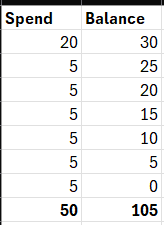There might be some simple explanation but i cannot figure it out.
You can’t just add the balances and expect it to amount to the same as the spend. Consider this: you spend 0, 0, 0, 50. Your balances are 50, 50, 50, 0. Adding up the balances you get 150. What does this mean? Absolutely nothing.
Maybe 1, 1, 1 -> 49, 48, 47 is a better example though. But same thing.
I wanted to keep it simple and avoid a factorial sum. My example also shows that the remainder sum goes up even when nothing is spent.
“I am your father’s brother’s nephew’s cousin’s former roommate”
Summing a balance column is never correct. Take any example that doesn’t end in a zero balance and it’s easy to see that the balance column’s sum is meaningless:

This calculation is a bit wrong.
Lets say for example you keep spending 5 after your first payment, then your totals at the bottom would be wrong and would look like this.

The correct way to do this is to accumulate the expenditure as your balance goes down, so that total for both spend and balance equals 50.

I hope this makes sense.
The balance has no reason to add up to 50. So there is no extra anything. If you kept spending 1 each row, and then summed the balance at the end, it would be massively higher than the 50 you started with.
OMG I do math all the time and the way the question was phrased I fell for it. (Summing balance)
I’m going to feel dumb for the rest of the day.
Remember in school when they made a big deal about the order of operations? This is why. It’s not clear as to why, as you’re not seeing the entire picture though, just some numbers.
This has nothing to do with order of operations.





